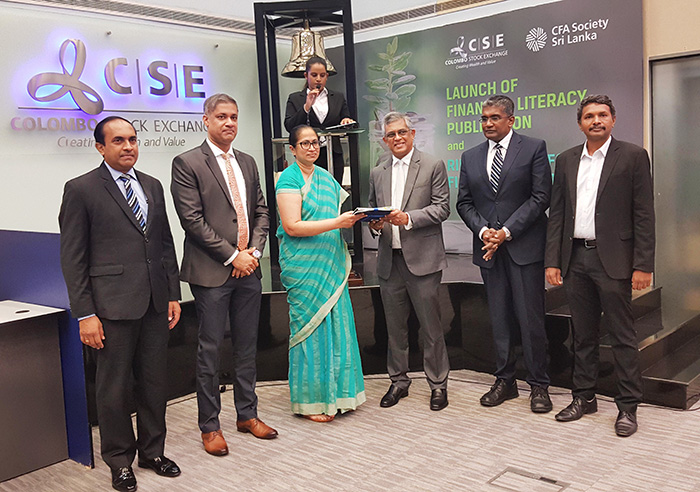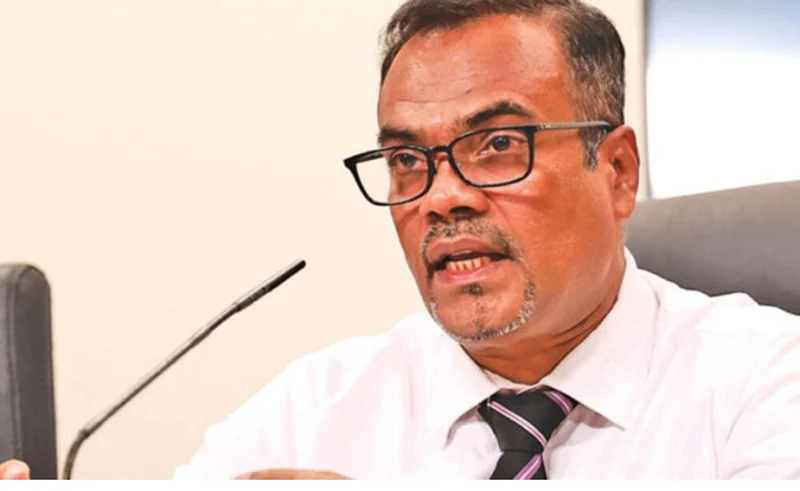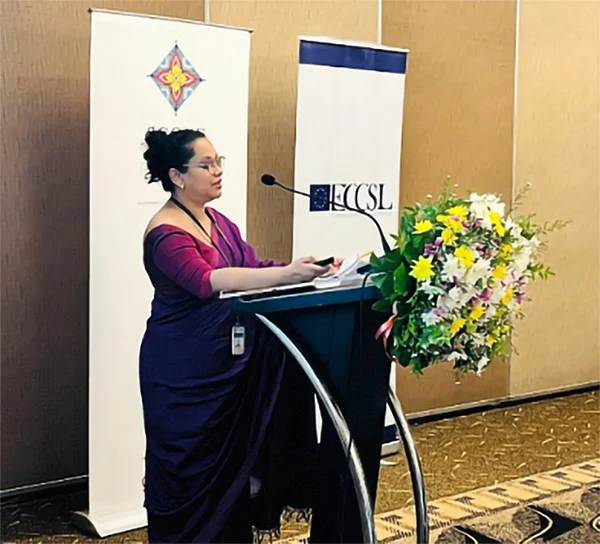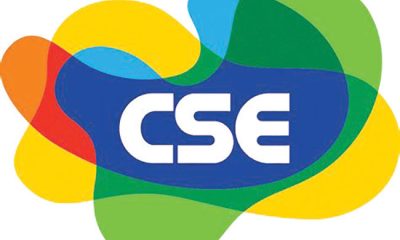Business
Sri Lanka accelerates financial literacy drive amid scams

by Sanath Nanayakkare
CFA Society Sri Lanka launched a financial literacy publication authored by Ravi Abeysuriya, CFA, Advocacy Chair of CFA Society Sri Lanka, at the Colombo Stock Exchange (CSE) yesterday.
The chief guest Ms. K M A N Daulagala, Deputy Governor of the Central Bank of Sri Lanka (CBSL), rang the market opening bell during the event marking another milestone of Sri Lanka’s ongoing endeavors, aiming at minimizing the risk of the public being deceived by investment schemes offered by untrustworthy and fake financial institutions and individuals.
By producing and distributing this book across universities and schools across the country, CFA Society and CSE hope to improve financial literacy rates in Sri Lanka so that people can make better, well-informed, choices when it comes to their finances and also be protected against unscrupulous operators in the financial space.
Ravi Abeysuriya speaking at the event said that the book authored by him gives general public the basic knowledge they need to understand the real opportunities in business, actual risks involved in investments and ways to take control of their financial future.
“The book extensively covers topics such as how to achieve financial independence and wealth, personal financial planning, understanding how to borrow smart, how to be prepared for unexpected turns of business and economic events etc”, he said.
“I request all corporates to do their utmost to improve financial literacy among the adult population in Sri Lanka as part of their CSR activities. When their employees have less financial burdens through better management of their personnel finances, the employers will have a satisfied workforce, and that will be a win-win situation for both employers and the employees. I also request policymakers and university academia present here to take their financial literacy drive from the universities to the schools throughout the country.”
“Economic literacy is also a vital element the people should know about. Due to lack of economic literacy, people in Sri Lanka didn’t question the viability of economic decisions made by the successive governments. Only after the sovereign debt crisis hit the country, our voters realized the damage caused to the economy by politicians through their wrong economic decisions and policies pursued in the past decades. So not only financial literacy, economic literacy also should take enough space in our discussions to liberate the national economy while getting people emancipated from financial scams taking place at various levels.”
Business
President AKD writes to President Trump over trade deficit concerns

In a bid to address mounting trade tensions, the Sri Lankan government has intensified efforts to reduce its significant trade deficit with the United States, Deputy Minister of Economic Development Dr. Anil Jayantha Fernando announced in parliament yesterday. He added that President Anura Kumara Dissanayake has despatched a formal letter to President Trump urging, among other things, a re-assessment of the recent enhanced tariff regime imposed on Sri Lanka.
The move follows reciprocal tariffs imposed by U.S. President Donald Trump, which Sri Lankan authorities say significantly affect key export sectors. The Deputy Minister indicated that the White House has acknowledged receipt of the Lankan President’s letter, signaling the launching of a potential bilateral dialogue.
Responding to a question raised by New Democratic Front (NDF) MP Ravi Karunanayake, Deputy Minister Fernando revealed that 88% of Sri Lanka’s trade deficit over the past five years stemmed from U.S. trade relations with apparel, rubber products, spices, other agricultural products and precious gems constituting 85% of total exports to the U.S. These exports, he noted, already face tariffs and paratariffs, but President Trump’s recent levies were calculated based on bilateral trade imbalances – a factor that has placed Sri Lanka’s economy under heightened pressure.
“The President’s intervention underscores our commitment to protecting Sri Lankan industries and fostering equitable trade terms, Fernando stated, defending the administration’s proactive and reactive measures to mitigate the US tariffs’ impact on local businesses.
Highlighting ongoing engagement, he added that another round of high-level discussions with the Office of the U.S. Trade Representative (USTR) was scheduled overnight. These talks aim to address structural trade imbalances and explore avenues for tariff relief, particularly for Sri Lanka’s apparel sector, which employs millions nationwide.
The President’s letter marks a strategic move in Sri Lanka’s diplomatic outreach, reflecting the government’s urgency to stabilise an economy still recovering from recent crises while in the middle of an IMF programme.
Sri Lankan industry leaders have cautiously welcomed the government’s efforts but emphasise the need for swift, tangible outcomes.
At present, all eyes remain on Washington’s response to President Dissanayake’s appeal – a potential turning point for Sri Lanka’s trade future, observers noted.
By Sanath Nanayakkare
Business
Inclusive and sustainable apparel for SDGs

The European Chamber of Commerce of Sri Lanka (ECCSL), in collaboration with the Strengthening Social Cohesion and Peace in Sri Lanka (SCOPE) programme, recently hosted its third industry-focused event, bringing together apparel-sector stakeholders to exchange experiences and practical insights on embedding inclusivity and sustainability into business operations.
Building on the success of ECCSL’s earlier events focused on tourism and food and agriculture, this apparel-focused gathering convened government representatives, industry leaders, business practitioners and the academia to discuss practical strategies for embedding inclusivity and sustainability into business operations.
While many businesses already recognize the importance of these principles, the event emphasized practical implementation, shifting the conversation from the “why” to the “how” of inclusive and sustainable practices.
Chamindry Saparamadu, Director General of the Sustainable Development Council of Sri Lanka, discussed how the Government of Sri Lanka is supporting businesses to create social and environmental impact through its Inclusive and Sustainable Business (ISB) Strategy. Ms. Saparamadu outlined how this strategy aims to create a resilient, equitable, and sustainable economy by building an ecosystem in which inclusive and sustainable businesses can thrive, driving transformative change across industries.
The event also featured engaging presentations from leading apparel businesses—Omega Line, Hirdaramani, and Compreli Consulting—each showcasing real-world examples of how inclusivity and sustainability can be embedded into business operations.
Omega Line, represented by Saman Jayasinghe (Chief HR Officer, Group – Administration) and Charman Dep (Assistant General Manager – Production Planning), presented its multifaceted sustainability approach, spotlighting its Vavuniya factory as a successful model for combining environmental stewardship with social impact.
Hirdaramani’s Manindri Bandaranayake (Chief Brand & Sustainability Officer for Sri Lanka, Bangladesh, Ethiopia, and Vietnam) showcased the company’s holistic sustainability framework, including its Wonders of Wellbeing (WOW) program, policies supporting differently-abled individuals, and deep community engagement.
Finally, Compreli Consulting co-founders Ramesh De Silva and Shehan Olegasageram showcased their innovative garment repair-as-a-service model—a circular, scalable solution that reduces waste and carbon emissions, while aligning with evolving global sustainability regulations.
Participants then had the opportunity to share their own knowledge in a group discussion, exchanging experiences and reflecting on the challenges and opportunities encountered in their sustainability journeys.
The event underscored the collective benefit of building Sri Lanka’s reputation as a global leader in inclusive and sustainable business. By fostering collaboration between businesses, the academic community and government stakeholders, the session aimed to accelerate broader industry adoption of these principles and contribute to Sri Lanka’s sustainable economic growth.
The discussions were facilitated by the Project Lead of ECCSL’s Inclusive Business Practices project, William Baxter.
Business
Union Assurance records Rs. 5.2 Billion PBT, fortifying its financial position by delivering best-in-class value

Union Assurance PLC, Sri Lanka’s longest-standing private Life Insurer, has recorded a strong financial performance with growth across key metrics for the year ending December 31, 2024. The Company achieved a 15% growth in gross written premium, totalling Rs. 21.6 billion driven by double-digit growth in both regular new business premiums and renewal premiums and paid Rs. 7.7 billion worth of claims and benefits to its customers during the year. In addition, for the year ending December 2024, the Company also declared an industry-leading universal life policyholder dividend rate of 12%, underscoring its continued commitment to deliver exceptional value to its customers.
Net investment income recorded a 9% year-on-year growth to reach Rs. 11.8 billion aided by an effective asset allocation strategy. The gains from the trading investment portfolio increased by 123% to reach Rs. 2.9 billion driven by the strong performance of the Colombo Stock Exchange during the latter part of the year.
Union Assurance distributed Rs. 3 billion as surplus from the policyholder fund and reported a profit after tax of Rs. 3.7 billion for 2024. The Company declared a final shareholder dividend of Rs. 5.00 per share amounting to a total payout of Rs. 2.9 billion.
A key milestone for Union Assurance in 2024 was the surpassing of Rs. 100 billion in total assets for the first time in its history, ending the year with Rs. 109.5 billion. This underscores the Company’s solid financial foundation and growth trajectory.
The Company’s assets under management grew by 15% during the year, reaching Rs. 95.6 billion driven by market valuation gains and cash generation from business operations. Furthermore, Union Assurance’s capital adequacy ratio stood at a healthy 264% at the end of 2024, well above the regulatory minimum of 120%.
-

 Business3 days ago
Business3 days agoColombo Coffee wins coveted management awards
-

 Business5 days ago
Business5 days agoDaraz Sri Lanka ushers in the New Year with 4.4 Avurudu Wasi Pro Max – Sri Lanka’s biggest online Avurudu sale
-

 Features4 days ago
Features4 days agoStarlink in the Global South
-

 Business6 days ago
Business6 days agoStrengthening SDG integration into provincial planning and development process
-

 Business5 days ago
Business5 days agoNew SL Sovereign Bonds win foreign investor confidence
-

 Sports7 days ago
Sports7 days agoTo play or not to play is Richmond’s decision
-

 Features4 days ago
Features4 days agoModi’s Sri Lanka Sojourn
-

 Midweek Review14 hours ago
Midweek Review14 hours agoInequality is killing the Middle Class





















